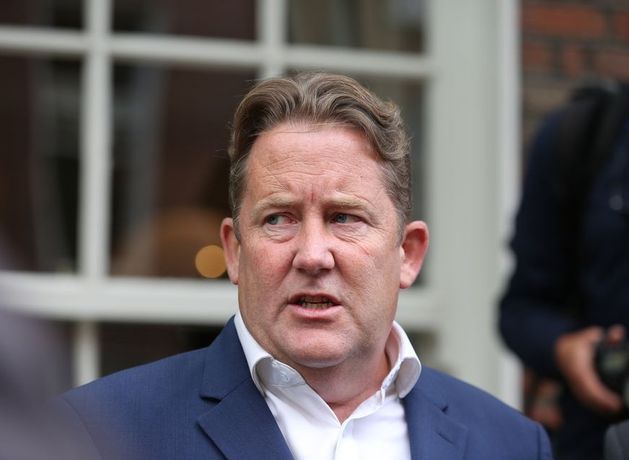On Saturday, Mr Trump shared statements on his Truth Social platform outlining 30pc tariffs on imports to the US from the EU and Mexico from August 1, separate to sector-specific tariffs, despite months of intensive talks.
However, the EU has pushed back its deadline for planned retaliation measures.
Mr O’Brien said negotiations between the EU and the US have been positive so far. A trade deal is yet to be reached, and the EU had hoped to negotiate a deal including zero-for-zero tariffs on industrial goods.
Asked on RTÉ’s This Week if Mr Trump’s announcement would spark a trade war, Mr O’Brien said: “We sincerely hope not.
“I think the Taoiseach has been very clear as well in really setting out that we want respectful dialogue to continue.
“There is still time in this space. The EU and the US enjoy the biggest economic relationship. It’s good for both blocs. It’s good for the EU, it’s good for the US.”
Mr O’Brien said tariffs are “good for no one”, and the EU will now be focused on pressing ahead with negotiations with a view to wrapping up a deal ahead of the 30pc tariff coming into effect on August 1.
“Obviously the statement issued by the US administration and President Trump in particular, is one that leads us to be greatly concerned, no question,” he said.
“But I think my understanding, as the Taoiseach has outlined, is the negotiations heretofore have been carried out in a very respectful way, in a business-like way, and I still believe we need to use the time between now and the first of August to conclude a deal that is good for both the European Union and the United States.”
Uncertainty brought by the threat of US tariffs has not been good for the economy, Mr O’Brien said, particularly relating to new investment in the private sector.
“We don’t want to catastrophise the situation either, and this may be a negotiation… We’ve outlined from the very start, actually during the general election campaign, my party leader and the Taoiseach was very clear to say that obviously any budgets we bring forward are fully mindful of the economic situation at the time,” he said.
“But really our focus as a government, between the Taoiseach and Tánaiste and all of my colleagues, is working with our European Union partners to conclude an arrangement that can allow us to continue to trade.
“Look, tariffs are good for no one, and obviously the trading situation that we have right now, prior to the new administration has been advantageous for both.
“It allows US companies access to their biggest market in the European Union, FDI from the United States is very important for us.”
Mr O’Brien added that the Irish people and economy “were very resilient post-Brexit” despite concerns over the impact of the UK leaving the EU at the time.
“There were many concerns, and rightly outlined at the time, about the impact that would have on businesses, and we managed our way through it, and working together I believe we will manage our way through this also,” he said.
On Sunday, European Commission president Ursula von der Leyen said the EU will will extend its suspension of countermeasures to US tariffs until early August as it aims for a negotiated solution on trade with the United States.
Announcing the extension of the halt on retaliatory measures which was due to expire on Monday, Ms von der Leyen said the bloc would “continue to prepare further countermeasures so we are fully prepared”.
A first package of countermeasures to US tariffs on steel and aluminium that would hit €21 billion in US goods was suspended in April for 90 days to allow time for negotiations.
A second package has been in the works since May and would target €72 billion of US goods, but these measures have not yet been made public and the final list requires approval by member states.
Ms von der Leyen added that use of the EU’s Anti-Coercion Instrument was not yet on the table.
“The [anti-coercion] instrument is created for extraordinary situations, we are not there yet,” she said.
The instrument allows the bloc to retaliate against third countries that put economic pressure on EU members to change their policies.
